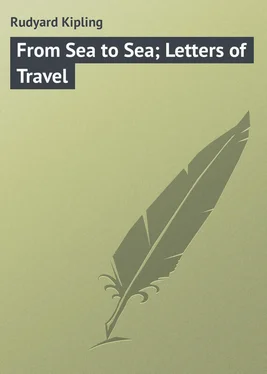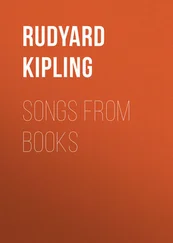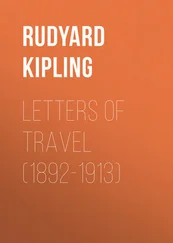Rudyard Kipling - From Sea to Sea; Letters of Travel
Здесь есть возможность читать онлайн «Rudyard Kipling - From Sea to Sea; Letters of Travel» — ознакомительный отрывок электронной книги совершенно бесплатно, а после прочтения отрывка купить полную версию. В некоторых случаях можно слушать аудио, скачать через торрент в формате fb2 и присутствует краткое содержание. Жанр: foreign_prose, foreign_language, на английском языке. Описание произведения, (предисловие) а так же отзывы посетителей доступны на портале библиотеки ЛибКат.
- Название:From Sea to Sea; Letters of Travel
- Автор:
- Жанр:
- Год:неизвестен
- ISBN:нет данных
- Рейтинг книги:5 / 5. Голосов: 1
-
Избранное:Добавить в избранное
- Отзывы:
-
Ваша оценка:
- 100
- 1
- 2
- 3
- 4
- 5
From Sea to Sea; Letters of Travel: краткое содержание, описание и аннотация
Предлагаем к чтению аннотацию, описание, краткое содержание или предисловие (зависит от того, что написал сам автор книги «From Sea to Sea; Letters of Travel»). Если вы не нашли необходимую информацию о книге — напишите в комментариях, мы постараемся отыскать её.
From Sea to Sea; Letters of Travel — читать онлайн ознакомительный отрывок
Ниже представлен текст книги, разбитый по страницам. Система сохранения места последней прочитанной страницы, позволяет с удобством читать онлайн бесплатно книгу «From Sea to Sea; Letters of Travel», без необходимости каждый раз заново искать на чём Вы остановились. Поставьте закладку, и сможете в любой момент перейти на страницу, на которой закончили чтение.
Интервал:
Закладка:
It was pleasant to sit down and watch the rush of the horses through the great opening – gates are not affected – going on to the countryside where they take the air. Here a boisterous, unschooled Arab shot out across the road and cried, "Ha! Ha!" in the scriptural manner, before trying to rid himself of the grinning black imp on his back. Behind him a Cabuli – surely all Cabulis must have been born with Pelhams in their mouths – bored sulkily across the road, or threw himself across the path of a tall, mild-eyed Kurnal-bred youngster, whose cocked ears and swinging head showed that, though he was so sedate, he was thoroughly taking in his surroundings, and would very much like to know if there were anybody better than himself on the course that morning. Impetuous as a schoolboy and irresponsible as a monkey, one of the Prince's polo ponies, not above racing in his own set, would answer the question by rioting past the pupil of Parrott, the monogram on his bodycloth flapping free in the wind, and his head and hogged tail in the elements. The youngster would swing himself round, and polka-mazurka for a few paces, till his attention would be caught by some dainty Child of the Desert, fresh from the Bombay stables, sweating at every sound, backing and filling like a rudderless ship. Then, thanking his stars that he was wiser than some people, Number 177 would lob on to the track and settle down to his spin like the gentleman he was. Elsewhere, the eye fell upon a cloud of nameless ones, purchases from Abdul Rahman, whose worth will be proved next hot weather, when they are seriously taken in hand – skirmishing over the face of the land and enjoying themselves immensely. High above everything else, like a collier among barges, screaming shrilly, a black, flamboyant Marwari stallion, with a crest like the crest of a barb, barrel-bellied, goose-rumped, and river-maned, pranced through the press, while the slow-pacing waler carriage-horses eyed him with deep disfavour, and the Maharaja Kanwar's tiny mount capered under his pink, Roman nose, kicking up as much dust as the Foxhall colt who had got on to a lovely patch of sand and was dancing a saraband in it. In and out of the tangle, going down to or coming back from the courses, ran, shuffled, rocketed, plunged, sulked, or stampeded countless horses of all kinds, shapes, and descriptions – so that the eye at last failed to see what they were, and only retained a general impression of a whirl of bays, greys, iron greys, and chestnuts with white stockings, some as good as could be desired, others average, but not one distinctly bad.
"We have no downright bad 'uns in this stable. What's the use?" said the Master of Horse, calmly. "They are all good beasts and, one with another, must cost more than a thousand rupees each. This year's new ones bought from Bombay and the pick of our own studs are a hundred strong about. May be more. Yes, they look all right enough; but you can never know what they are going to turn out. Live-stock is very uncertain." "And how are the stables managed? how do you make room for the fresh stock?" Something this way. Here are all the new ones and Parrott's lot, and the English colts that Maharaja Pertab Singh brought out with him from Home. Winterlake out o' Queen's Consort that chestnut is with the two white stockings you're looking at now. Well, next hot weather we shall see what they're made of and which is who. There's so many that the trainer hardly knows 'em one from another till they begin to be a good deal forward. Those that haven't got the pace, or that the Maharaja don't fancy, they're taken out and sold for what they'll bring. The man who takes the horses out has a good job of it. He comes back and says: "I sold such and such for so much, and here's the money." That's all. Well, our rejections are worth having. They have taken prizes at the Poona Horse Show. See for yourself. Is there one of those that you wouldn't be glad to take for a hack, and look well after too? Only they're no use to us, and so out they go by the score. We've got sixty riding-boys, perhaps more, and they've got their work cut out to keep them all going. What you've seen are only the stables. We've got one stud at Bellara, eighty miles out, and they come in sometimes in droves of three and four hundred from the stud. They raise Marwaris there too, but that's entirely under native management. We've got nothing to do with that. The natives reckon a Marwari the best country-bred you can lay hands on; and some of them are beauties! Crests on 'em like the top of a wave. Well, there's that stud and another stud and, reckoning one with another, I should say the Maharaja has nearer twelve hundred than a thousand horses of his own. For this place here, two wagon-loads of grass come in every day from Marwar Junction. Lord knows how many saddles and bridles we've got. I never counted. I suppose we've about forty carriages, not counting the ones that get shabby and are stacked in places in the city, as I suppose you've seen. We take 'em out in the morning, a regular string altogether, brakes and all; but the prettiest turn-out we ever turned out was Lady Dufferin's pony four-in-hand. Walers – thirteen-two the wheelers, I think, and thirteen-one the leaders. They took prizes in Poona. That was a pretty turn-out. The prettiest in India. Lady Dufferin, she drove it when the Viceroy was down here last year. There are bicycles and tricycles in the carriage department too. I don't know how many, but when the Viceroy's camp was held, there was about one apiece for the gentlemen, with remounts. They're somewhere about the place now, if you want to see them. How do we manage to keep the horses so quiet? You'll find some o' the youngsters play the goat a good deal when they come out o' stable, but, as you say, there's no vice generally. It's this way. We don't allow any curry-combs. If we did, the saises would be wearing out their brushes on the combs. It's all elbow-grease here. They've got to go over the horses with their hands. They must handle 'em, and a native he's afraid of a horse. Now an English groom, when a horse is doing the fool, clips him over the head with a curry-comb, or punches him in the belly; and that hurts the horse's feelings. A native, he just stands back till the trouble is over. He must handle the horse or he'd get into trouble for not dressing him, so it comes to all handling and no licking, and that's why you won't get hold of a really vicious brute in these stables. Old Ringwood he had four saises , and he wanted 'em every one, but the other horses have no more than one sais apiece. The Maharaja he keeps fourteen or fifteen horses for his own riding. Not that he cares to ride now, but he likes to have his horses; and no one else can touch 'em. Then there's the horses that he mounts his visitors on, when they come for pig-sticking and such like, and then there's a lot of horses that go to Maharaja Pertab Singh's new cavalry regiment. So you see a horse can go through all three degrees sometimes before he gets sold, and be a good horse at the end of it. And I think that's about all!"
A cloud of youngsters, sweating freely and ready for any mischief, shot past on their way to breakfast, and the conversation ended in a cloud of sand and the drumming of hurrying hooves.
In the Raika-Bagh are more racing cups than this memory holds the names of. Chiefest of all was the Delhi Assemblage Cup – the Imperial Vase, of solid gold, won by Crown Prince . The other pieces of plate were not so imposing. But of all the Crown Jewels, the most valuable appeared at the end of the inspection. It was the small Maharaja Kanwar lolling in state in a huge barouche – his toes were at least two feet off the floor – that was taking him from his morning drive. "Have you seen my horses?" said the Maharaja Kanwar. The four twelve-hand ponies had been duly looked over, and the future ruler of Jodhpur departed satisfied.
Читать дальшеИнтервал:
Закладка:
Похожие книги на «From Sea to Sea; Letters of Travel»
Представляем Вашему вниманию похожие книги на «From Sea to Sea; Letters of Travel» списком для выбора. Мы отобрали схожую по названию и смыслу литературу в надежде предоставить читателям больше вариантов отыскать новые, интересные, ещё непрочитанные произведения.
Обсуждение, отзывы о книге «From Sea to Sea; Letters of Travel» и просто собственные мнения читателей. Оставьте ваши комментарии, напишите, что Вы думаете о произведении, его смысле или главных героях. Укажите что конкретно понравилось, а что нет, и почему Вы так считаете.












